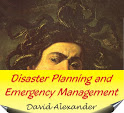It is currently very fashionable to apply the methodologies of operations research to disaster mitigation, management and response. Is this a fashion or a fad? Will the algorithms be used and appreciated, or are they merely wasted effort? Do the algorithm makers understand what conditions are like in a disaster, and what the real needs of managers and responders are?
In disaster management there is a well-founded hostility towards over-sophisticated routines and equipment. Managing emergencies will always be a rough-and-ready process, in which most of what is done is a kind of approximation. Such is the nature of uncertainty and rapid change in the field that it could never be otherwise.
If operations research is to make a useful contribution to disaster management, it will have to take account of these principles:-
1. In emergencies, 'optimisation' is a very relative term. Pre-planned activities require considerable scenario modelling in order to take account of the real needs that will be generated during a future emergency.
2. Optimisation based on an assessment of pre-disaster conditions is unlikely to be relevant to the post-disaster situation. Infrastructure will be damaged, inefficient and probably partly non-functional.
3. Optimisation that assumes perfect knowledge of the situation is bound to fail. During major emergencies, the common operating picture is constructed slowly and with difficulty. One cannot optimise a situation that is partially unknown.
4. Algorithms that are designed to be used in emergency situations should be capable of deployment during emergencies. This means that at the height of a crisis time cannot be expended on collecting data or running lengthy analyses.
5. To make an algorithm credible, evidence should be provided that it is acceptable to field commanders, who would use it or act upon the results that it provides. Optimisation is not an objective held by most emergency managers and field commanders. An algorithm that does not take account of their needs and ways of thinking is highly unlikely to be appreciated or utilised by them.
6. Decision support systems are welcomed if they really do support decision making. No sensible emergency manager would put blind faith in an algorithm unless the results clearly demonstrate that it works and visibly improves the situation.
7. Flexibility is an essential ingredient of any algorithm. In disasters, conditions on the ground can change abruptly and without warning. Algorithm makers need to understand the difference between 'agent-generated demands' and 'response-generated demands', as described in the classical literature on the sociology of disasters.
In disaster management there is a well-founded hostility towards over-sophisticated routines and equipment. Managing emergencies will always be a rough-and-ready process, in which most of what is done is a kind of approximation. Such is the nature of uncertainty and rapid change in the field that it could never be otherwise.
If operations research is to make a useful contribution to disaster management, it will have to take account of these principles:-
1. In emergencies, 'optimisation' is a very relative term. Pre-planned activities require considerable scenario modelling in order to take account of the real needs that will be generated during a future emergency.
2. Optimisation based on an assessment of pre-disaster conditions is unlikely to be relevant to the post-disaster situation. Infrastructure will be damaged, inefficient and probably partly non-functional.
3. Optimisation that assumes perfect knowledge of the situation is bound to fail. During major emergencies, the common operating picture is constructed slowly and with difficulty. One cannot optimise a situation that is partially unknown.
4. Algorithms that are designed to be used in emergency situations should be capable of deployment during emergencies. This means that at the height of a crisis time cannot be expended on collecting data or running lengthy analyses.
5. To make an algorithm credible, evidence should be provided that it is acceptable to field commanders, who would use it or act upon the results that it provides. Optimisation is not an objective held by most emergency managers and field commanders. An algorithm that does not take account of their needs and ways of thinking is highly unlikely to be appreciated or utilised by them.
6. Decision support systems are welcomed if they really do support decision making. No sensible emergency manager would put blind faith in an algorithm unless the results clearly demonstrate that it works and visibly improves the situation.
7. Flexibility is an essential ingredient of any algorithm. In disasters, conditions on the ground can change abruptly and without warning. Algorithm makers need to understand the difference between 'agent-generated demands' and 'response-generated demands', as described in the classical literature on the sociology of disasters.

